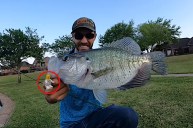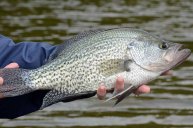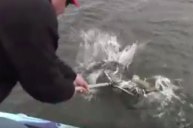An angler managed to break a state record, but not without a bit of fright on his part. He admittedly panicked when he realized the fish he hooked was a monster for its species.
Jerry Porter and friends, Ron and Rodney Shelton were fishing at East Lynn Lake in West Virginia on May 6. That's when Porter managed to hook a record-breaking black crappie. It was bigger than the other fish he caught.
"The crappies were bedding and hit everything we cast to them around a fallen oak tree," Jerry Porter told Outdoor Life. "Every cast we hooked a fish. Then I stuck one that was different — bigger than all the others, and I panicked."
He explained that one of his friends managed to grab a net and bring the crappie in. They were fishing off a Bass Tracker boat. It was the cherry on top of a very successful fishing trip.
State Record Fish
"We fished until four that afternoon because the action was incredible," Porter said. "I know we caught 300 crappies that day before we headed in."
At the request of a friend, Porter decided to report the fish to the West Virginia's Department of Natural Resources. They theorized that the fish could be a record breaker. The only problem was that it was closed for the day. So Porter had to wait.
He explained, "DNR was closed for the day, so I took the crappie home and put it in water until the next day when state offices were open."
First thing in the morning, he drove to their offices. DNR fisheries biologist Jake Whalen weighed and measured the fish. He determined that the crappie was 3.6 pounds and also 17.7 inches long. That made for a new state record. The previous state record for black crappie was 3.15 pounds.
Dwight Priestly had caught that one in 2024. Sometimes you win some and lose some. Porter plans to have the crappy mounted.
"The lake is jammed with 7- to 9-inch crappies, and we need to keep more of them to keep from overpopulating the lake," says Porter. "There are some big ones, but they have to compete for food with all the little fellows.




